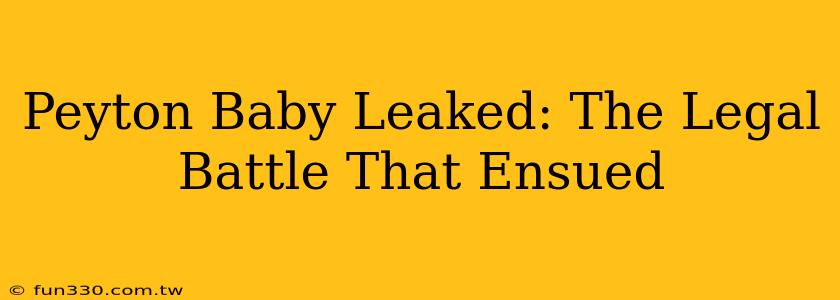Peyton Baby Leaked: The Legal Battle That Ensued
The internet age has blurred the lines between private life and public exposure, and few cases illustrate this more dramatically than the "Peyton Baby Leaked" incident. While the specifics of the case remain shrouded in some legal confidentiality, the core issue involved the unauthorized distribution of intimate images or videos of a minor, leading to a significant legal battle with far-reaching consequences. This article delves into the key aspects of this case, highlighting the legal ramifications and the ongoing fight for privacy in the digital age.
Understanding the Core Issue:
The "Peyton Baby Leaked" case, as it became known online, centers around the alleged non-consensual dissemination of private visual content featuring a child. The exact nature of the content and the methods used for its distribution remain largely undisclosed due to ongoing legal proceedings and the sensitive nature of the material. However, the central issue revolves around violations of privacy, child exploitation laws, and potential criminal charges against those responsible for the leak.
The Legal Ramifications:
The legal battle stemming from this incident involves several key areas of law:
-
Child Pornography Laws: The unauthorized sharing of explicit content featuring minors is strictly prohibited and carries severe penalties under federal and state laws. The penalties can include hefty fines, lengthy prison sentences, and inclusion on sex offender registries. The severity of the charges often depends on the nature of the content and the intent of the perpetrator.
-
Privacy Violations: Even if the content itself doesn't explicitly meet the definition of child pornography, its unauthorized release constitutes a violation of privacy. Civil lawsuits can be filed against those responsible for the leak, seeking compensation for emotional distress, reputational damage, and other harms suffered by the victim and their family.
-
Cybercrime Laws: The methods used to distribute the content—whether through online platforms, peer-to-peer sharing, or other means—can lead to additional criminal charges related to cybercrime, such as unauthorized access, data breach, or distribution of harmful materials online.
The Ongoing Fight for Privacy:
The "Peyton Baby Leaked" case highlights the ongoing struggle to protect individuals, especially minors, from the harms of online exploitation and privacy violations. The case serves as a stark reminder of the importance of:
-
Digital Citizenship: Educating individuals, especially children and young adults, about responsible online behavior, the dangers of sharing private information, and the consequences of non-consensual content distribution.
-
Online Safety Measures: Encouraging the use of strong passwords, privacy settings, and other security measures to protect personal information and prevent unauthorized access.
-
Platform Accountability: Holding social media platforms and other online service providers accountable for their role in preventing and addressing the spread of non-consensual intimate images and videos.
Conclusion:
The "Peyton Baby Leaked" case underscores the urgent need for stronger legal frameworks and proactive measures to combat online exploitation and protect the privacy of individuals, particularly children. While the details of the specific case may remain partially confidential due to legal reasons, the broader implications for online safety and the fight for digital privacy are undeniable and demand continued attention and action. This incident serves as a cautionary tale, highlighting the devastating consequences of non-consensual content sharing and the ongoing battle to create a safer digital world. The legal battles fought in this case, while focusing on one specific incident, have the potential to set important precedents and influence future legislation aimed at protecting vulnerable individuals online.
